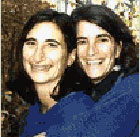
Dear Gabe 2004
Distributed by Cinema Guild, 115 West 30th Street, Suite 800, New York, NY 10001; 212-685-6242
Produced by Alexandra Juhasz
Directed by Alexandra Juhasz
VHS, color, 50 min.
Sr. High - Adult
Gay and Lesbian Studies, Gender Studies, Women's Studies, Sociology
Date Entered: 06/21/2005
Reviewed by Lisa Flanzraich, Queens College, Flushing, New YorkAlexandra Juhasz has written an insightful, moving, and fascinating video letter to her 3 year old son, Gabe.
In it, she has documented her radicalization as a feminist, lesbian, and mother, starting with her college years at Amherst College in the 1980’s. There, she shared a house with 6 other women and one gay man. They all became life-long friends, despite geography and different lifestyles. Unfortunately, Jim has since died of AIDS.
These women represent the third wave of feminism. Their strength and conviction about the full and creative lives that they want for themselves and their children are apparent. Thus, the letter is both a personal and political account of how the liberation movements of the 1960’s - civil rights, gay rights, women’s rights - have permanently changed the baby boom generation as well as the social and cultural landscape of many parts of the United States.
The letter is a vehicle for Juhasz to communicate her feelings and thoughts about families, sex roles, and race. With eloquence, she expresses the “spirit and anxieties of a generation” as she “navigates this new world” for both her son and us.
Now in their 40’s Alexandra, Hali, Debra, Hara, and Kim have young children. Page and her partner are childless. Hali has a partner while Alexandra and Debra have dissolved their past interracial gay relationships. However, an informal shared custody exists among the ex-lovers who have either engendered or adopted uni-racial children. Kim and Hara have heterosexual marriage but echo the stress of working mothers who try to balance both career and home responsibilities. Kim is an obstetrician; Hara is a rabbi and an editor of a Jewish newspaper.
However, pioneering the New Age does not mean automatic freedom from the straightjacket of the nuclear, homogenous family structure that still exists today. Deb, who is an HIV educator, reflects on her “Afro-American Jewish daughter living in two communities with lesbian divorced parents.” With understandable apprehension, she implies that the troublesome thorns outside of New Age paradise may eventually stick her child. As a bridge builder, Hali wants to invite her neighbors to her house to show them that she and her partner are not that different from them in their desire to raise a family. Kim experiences discrimination at the hospital where she is told by a male doctor that “she cannot have it all.” Hali, who is also a medical doctor, misses spending time with her daughter while she works.
The filmmaker has written a clean and articulate narrative to accompany her story. Moreover, she has created a fine primary source for social research. Viewers will also enjoy the original and distinctive score composed by Sheri Ozeki.